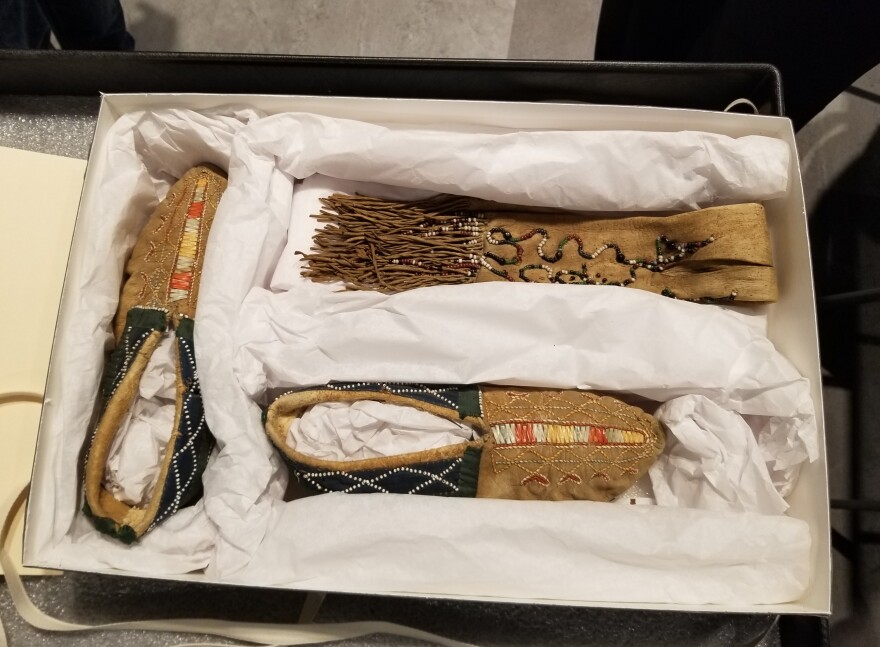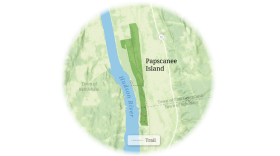In a classroom on the museum’s second floor, Bonney Hartley whispered a quiet prayer over a box containing an ornate pair of beaded, orange and green moccasins and a wampum bag while sprinkling tobacco and cedar over them from a ceremonial pouch.
“Cedar is for protection," she explained.
"Tobacco is our way of offering prayers. When I take them back to our office, I'll also light a sage and smudge them. But we just want to cleanse them off and welcome them back home and let them know that what's happening to them, that they're returning from here to go back to our community.”

Hartley’s name in Munsee is Taheekwundoheet, which means “she has her arms around the People.” She’s the Tribal Historic Preservation Manager of the Stockbridge-Munsee Community, working out of a Williamstown office. She focuses on preserving the community’s cultural landmarks, overseeing the return ancestral artifacts and remains from colonial institutions.
The community lived in a vast stretch of the Northeast for centuries before the arrival of European colonists in the 1600s, and were officially recognized as the Stockbridge-Munsee while centered in that Berkshire community in the 1700s.
“Our ancestors fought really valiantly in the Revolutionary War on the side of the new colonial America," said Hartley. "And for those that did return to the town of Stockbridge, many people's land had been taken by the Williams family, really notably, and others, and others obviously lost their lives in the war. And so our tribe was diminished, and actually not really seen as having a lot of value or use at that point for our strengths around diplomacy, for example, and working among other tribes during the Revolutionary War.”
After years of broken promises from colonists, along with one-sided deals and outright banishment from their homeland, the Stockbridge-Munsee made their way west. That’s where the moccasins and wampum bag – believed to possibly be the belongings of sachem Konkapot, a community leader in the 1700s – will eventually end up.
“They’ll go back temporarily to our historic preservation office and then make their way to our tribal library museum on our reservation, Wisconsin, the Arvid E. Miller Memorial Library Museum," said Hartley. "So there'll be displayed there so community members – again, especially direct Konkapot descendants – can have that opportunity to, to view them to directly engage with them and add, I think, a lot of life and meaning to them as well.”
Hartley says that recent decolonization movements and the Black Lives Matter movement have led to a renewed understanding by museums about the importance of listening to tribes as they seek to repatriate long-lost community belongings.
“In 1958, when the [Berkshire] Museum obtained them, we were on the cusp of having a tribal archive of museums at that time, but we didn't just yet," she told WAMC. "And so if there were items like that, museums were often, would say that they're doing the best thing by protecting them, that otherwise they may be lost to history. But, you know, shortly thereafter, we did establish our own tribal archives, which we still have, and we have completely up to par facilities and are completely able to curate these materials on our own.”
While the process has become easier over the years, many hurdles remain for the Stockbridge-Munsee.
“I think the biggest issues that we still face are with working to affiliate ancestors’ remains where they've ended up at museum shelves," Hartley told WAMC. "And so I think probably the biggest struggle is still, unfortunately, with some museums, of being able to make the case that we know who these people are, that we know these are our ancestors, we know that they're from our homelands, and we articulate the case and that still, sometimes it's a barrier. It's been improving. But I would say, the magnitude- I think most people aren't aware of the magnitude to which all tribal nations are engaged in that kind of effort. In Massachusetts, there's still, I believe, around 9,000 human remains that are still on university and museum shelves within the state.”
While the Stockbridge-Munsee were unfairly ripped from their home in the Berkshires centuries ago, Hartley says she feels a deep and immediate bond to the land.
“I often feel like [that] we're being led by the work that our ancestors want us to do or want us to find. Especially when we're doing archaeology and sites emerge, it often feels like this is what they want us to find at this moment in time. But I think with the colonial settler dynamic as well, I think, from the 1700s to local residents now, I think that that's still something that is kind of unfinished business in a way, where there's kind of a more of a reckoning, like, these being Mohican homelands. You know, you can't deny that if you dig a site or, unfortunately, a burial up, you can't deny the existence of these being our lands. I mean, it's just very direct evidence right here in the earth.”





